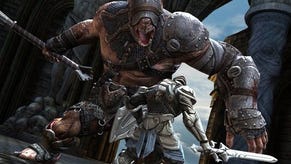Game of the Week
To infinity, and repeat.
Here's what we were(n't) picking from: Out This Week.
As I mentioned last week, there's no reason the download gaming scene needs to slow down over Christmas, and no reason we have to endure the traditional drought of new releases between early December and late January.
So it proves. Over the next three weeks we'll be treated to abstract PlayStation Move puzzler Echochrome II, Battlefield: Bad Company 2's Vietnam expansion, the first episode of Telltale's Back to the Future series on PC and Mac, 360-exclusive Dead Rising 2 epilogue Case West and a tempting trio of Xbox Live Arcade releases: World of Keflings, Raskulls and ilomilo. We've heard very good things about the latter two at least.
This week was less interesting on the consoles – with the possible exception of Quake Arena Arcade (reviewed next week) – but the App Store saw a sudden avalanche of games. Sequels to "proper game" pretenders Real Racing and NOVA, a handheld Bad Company 2, a port of the splendid Lara Croft and the Guardian of Light, Shadow Guardian, Yoot Saito's Yoot Tower, Broken Sword 2 and the PC and WiiWare puzzle classic World of Goo all popped up.
Even this all-star line-up, though, was overshadowed by an iOS game which was released last week, but which we only got around to reviewing this week – and which might yet count as one of the most significant releases of 2010.
Infinity Blade
When Apple was finally persuaded to get over its snobbery and start acting like it was in possession of one of the world's most vibrant and successful gaming platforms – pause for long-time Mac owners to savour the staggering irony – it did so in the time-honoured platform-holder tradition: by holding an Unreal Engine demonstration. (That Mark Rein could sell anything. He could probably get Barack Obama to mention Unreal Engine 3 in the State of the Union address.)
After we'd all declared ourselves astonished and impressed by the quality of the graphics, we immediately split into two camps. We either started fantasising about a handheld Oblivion, or gloomily predicting that the end result would be a glorified tech demo.
Forunately, Epic didn't put us in charge of actually making the game. Instead, it turned to Chair, the subsidiary studio responsible for last year's excellent XBLA adventure Shadow Complex. And Chair took this as an opportunity to pose a fascinating question: what would happen if you crossed Punch-Out!! with Demon's Souls?
Something surprisingly awesome, as Mark discovered in our review. Rather than try to cut a console or PC game down to size, as id arguably did with Rage, Chair crafted a true mobile game that just happened to look like one of its big brothers. Bite-sized but compelling, Infinity Blade's clever premise and finely-tuned touch-screen combat help it gracefully dodge the issue of its limited content.
"Get it because it's ferociously satisfying, well designed and well executed," wrote Mark. "Get it because it easily reaches far greater heights than a mere tech show-off. In fact, it's so much fun I didn't even feel the need to mention Unreal Engine 3 once. Except there. Damn."
The premium graphics and gameplay also enabled Epic to set a premium price. Infinity Blade smashed through the 99-cent tyranny of the App Store and smashed sales records on the platform to boot. You can be sure every game publishing executive will be taking those numbers home to mull over this Christmas. And filling out Unreal Engine 3 order forms in the New Year.




